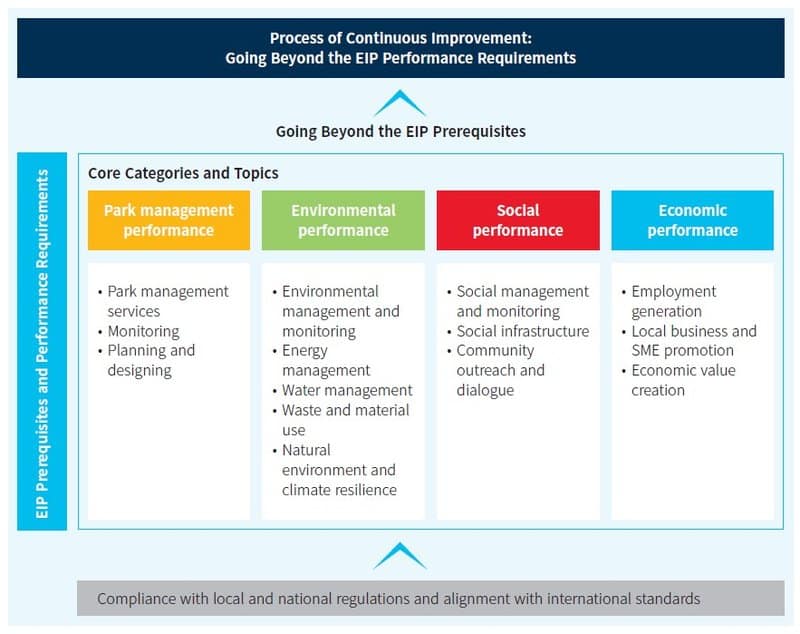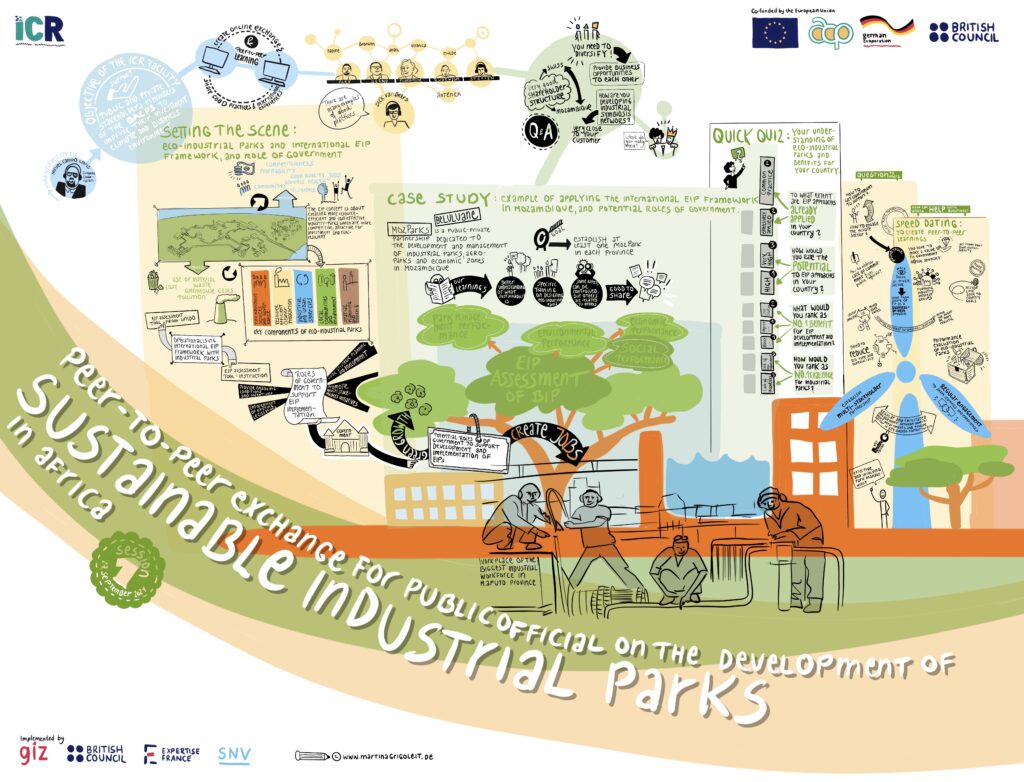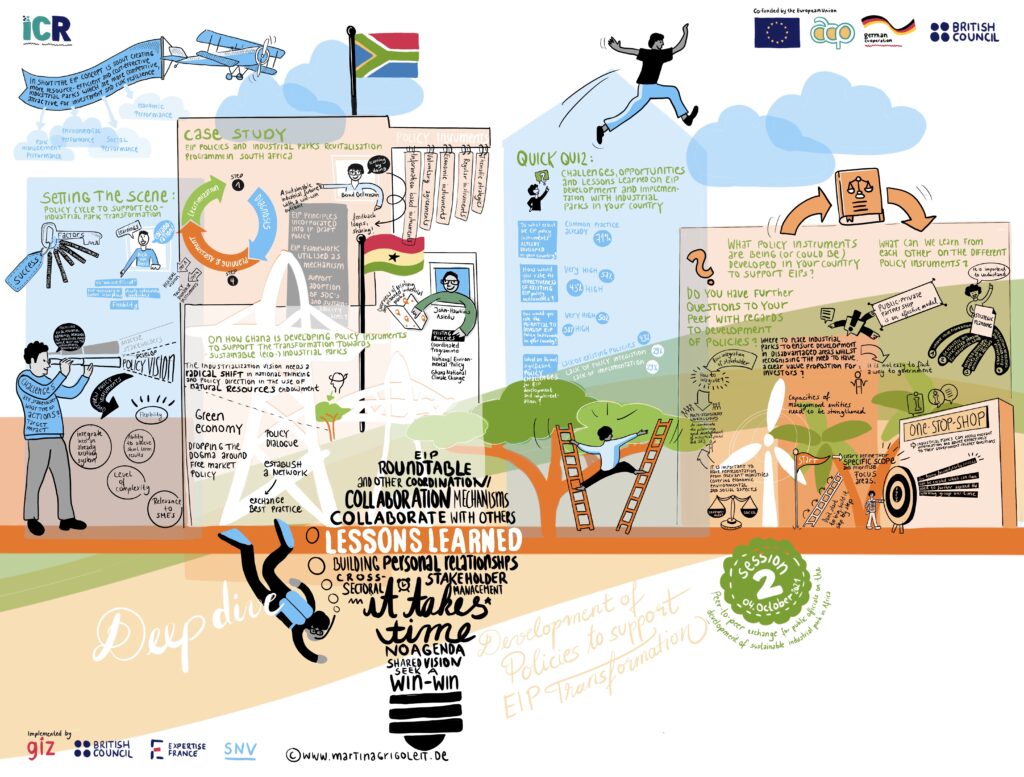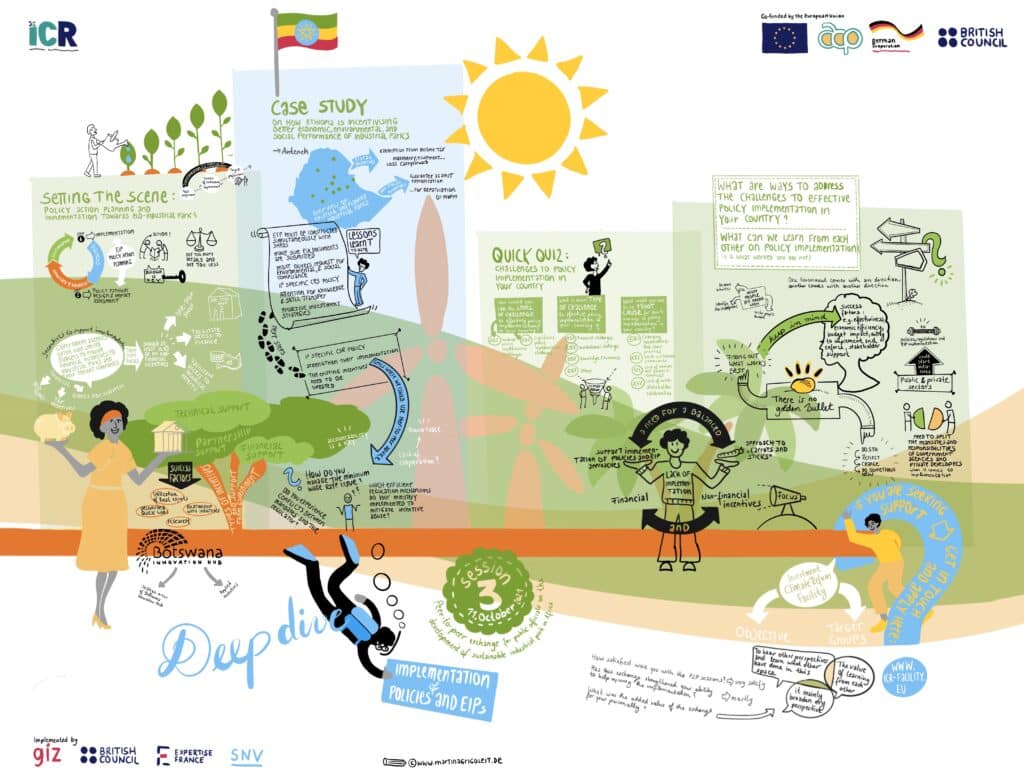Multiple African countries seek to industrialise their economy through industrial parks. To ensure this will lead to positive development impacts, it is key that those parks are sustainable with regards to their economic, environmental, and social performance as well as the performance of the park management. This can aid a Green Recovery and is in line with relevant international agendas, such as the European Green Deal.
The Investment Climate Reform (ICR) Facility organised a peer-to-peer learning event series in October 2021 to enable an exchange between government officials from Africa on the development of so called eco-industrial parks (EIPs). EIPs are more resource-efficient, risk resilient, socially just and cost-effective and thus provide a more attractive climate for investment and one where local communities benefit as well. Discussions highlighted several important takeaways for policy makers that seek to transform industrial parks into EIPs:
- Governments play an important role to guide the strategic planning and development of (eco-)industrial parks and by providing enabling conditions, such as incentives for parks to be more sustainable.
- Each industrial park is part of a broader system which affect many different stakeholders. Strong Public-Private Dialogue is therefore key. This can be in the form of national stakeholder fora on sustainable industrialisation in general or on specific issues affecting the eco-industrial park transformation in particular.
- The main challenge is often policy implementation even where enabling policies exist, this includes a lack of awareness by industrial parks as to how to access information and advice.
Governments Play A Key Role In Guiding Strategic Planning And Providing Enabling Conditions
Shortcomings in the strategic planning of industrial parks are generally very costly. Governments play an important role to guide the strategic planning and development of (eco-)industrial parks. For the strategic planning, it is of key importance to understand the following: (1) the unique value proposition of targeted regions/locations; (2) be realistic on anticipated demand for industrial land on the short-/medium/long-term; (3) expected developments of targeted industry sectors; (4) integration with existing and planned infrastructures at local, regional and national levels. To ensure a sustainable development of an industrial park, issues such as creating linkages with local SMEs, decent working conditions, and resource efficiency are key to consider.
Further, Governments (at local, provincial and national level) have a role to play in creating enabling conditions. These can be financial and non-financial incentives to support the transformation towards eco-industrial parks. Government agencies often have limited budgets to provide financial incentives to industrial parks and their tenant companies. Therefore, focus should at least also be on non-financial incentives (e.g. facilitate access-to-finance for green investments and access to technical experts).
The “INTERNATIONAL FRAMEWORK FOR ECO-INDUSTRIAL PARKS” published by GIZ, UNIDO and World Bank Group provides guidance on what constitutes an Eco-Industrial Park (EIP) and how an industrial park can work towards becoming an EIP. This provides a helpful starting point for Governments that seek to strengthen the sustainability of industrial parks in their country. With support from the ICR Facility, the framework was also used by MozParks in Mozambique to identify and implement prioritized opportunities to further strengthen the economic, environmental and social performance of Beluluane Industrial Park (WWW.ICR-FACILITY.EU/TRANSFORMATION-OF-THE-BELULUANE-INDUSTRIAL-PARK-INTO-AN-ECO-INDUSTRIAL-PARK).

Strong Public-Private Dialogue Is Key
Industrial parks are multi-disciplinary systems which bring together many different stakeholders. International experiences show that successful eco-industrial parks have close collaborations between industries, government agencies, civil society organisations, communities. Therefore, government agencies in various countries are looking into creating multi-stakeholder working groups to coordinate the planning and development of (eco-)industrial parks. For these working groups it is important to have representation from relevant ministries covering economic, environmental, and social aspects of industrial parks. To start these working groups, it is advisable to firstly clearly define their specific scope and prioritise focus areas. It is often most effective for these working groups to initially focus on a few key priorities, rather than trying to tackle too many multi-disciplinary issues at once. By being focused, early successes can be created which can then be used to further expand the working group over time (e.g. process of continuous improvement).
At the ICR Facility’s peer-to-peer learning event, the Department of Trade, Industry and Competition in South Africa (the dtic) shared how they are adapting the International EIP Framework to the national context in order to support South African industrial parks in their transformation towards EIPs. In particular, it is being used as an umbrella under which a stakeholder forum has been established which meets regularly to discuss the development and implementation of eco-industrial parks in the country.
Policy Implementation Needs More Attention
Ideally countries have both conducive policies and supporting legislations which are being enforced appropriately. But even where existing policies and legislations are relatively well developed, what is often lacking is their implementation. Participants at the peer-to-peer exchange noted that the focus is often too much on providing incentives, rather than enforcing legislations and industrial parks’ requirements. Many industrial parks find it a challenge to get access to relevant information on government policies, regulations and associated programmes (e.g. government licensing, innovation promotion, skills development). One-stop-shops offer one way to enable industrial parks to access relevant information and advice effectively and efficiently with regards to their government-related questions regarding their transformation towards eco-industrial parks.



The ICR Facility supported the production of this publication. It is co-funded by the European Union (EU), the Organisation of African, Caribbean and Pacific States (OACPS) under the 11th European Development Fund (EDF), the German Federal Ministry for Economic Cooperation and Development (BMZ) and the British Council. The ICR Facility is implemented by GIZ, the British Council, Expertise France, and SNV. The contents of the publication are the sole responsibility of the author and do not necessarily reflect the views of the EU, OACPS, BMZ or of the implementing partners.
